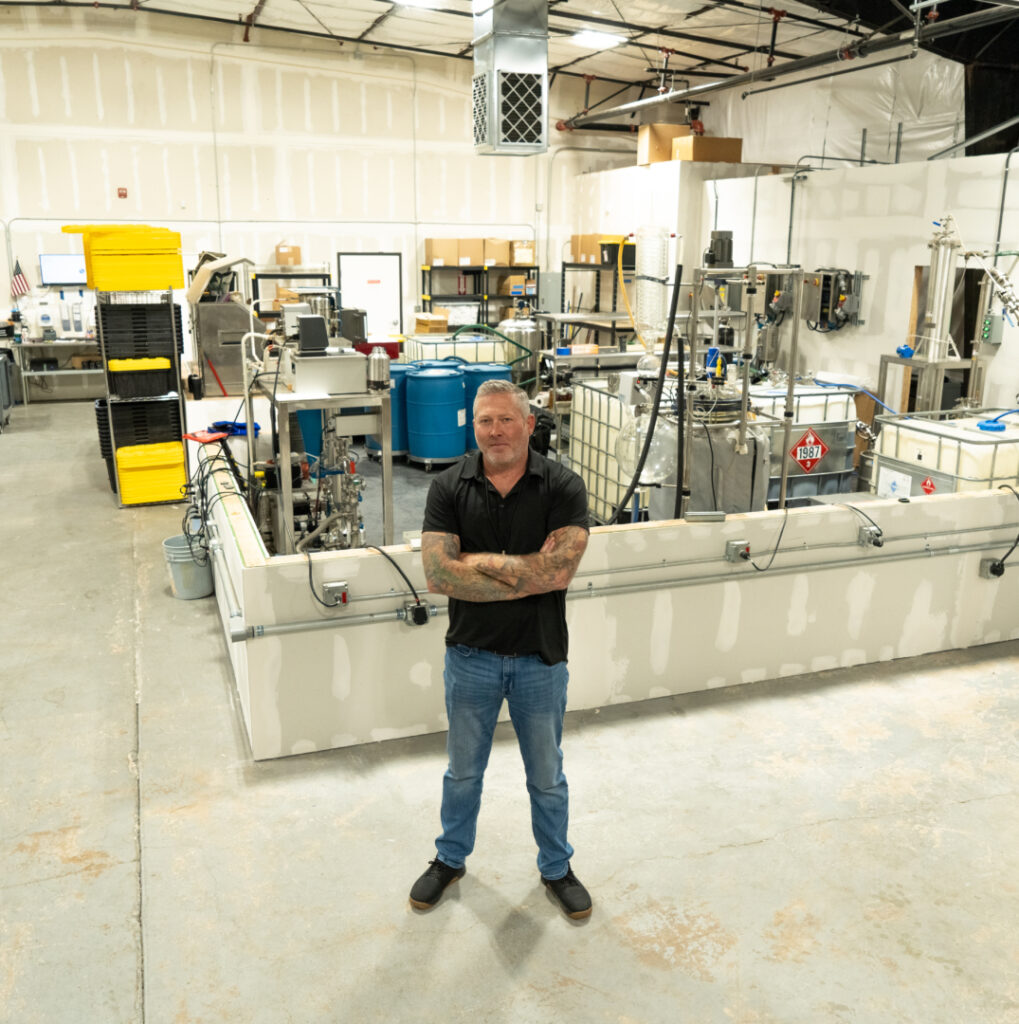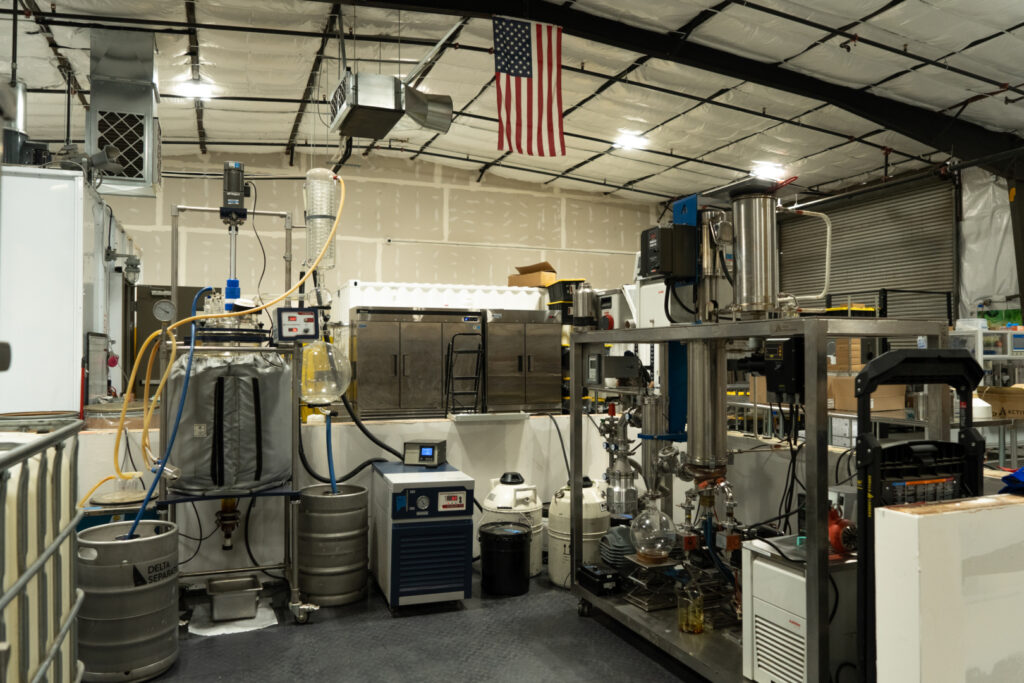Zinger Key Points
- C4’s business is built on collaboration, with a primary focus on white-label manufacturing.
- Automation allowed C4 to scale up or down without the heavy burden of overhead, critical in this unpredictable market.
- C4's focus on workforce development echoes the history of American manufacturing, where trades provided pathways to economic mobility.
- Today's manic market swings are creating the perfect setup for Matt’s next volatility trade. Get his next trade alert for free, right here.
At C4, in Chico, California, the benefits of automation go beyond efficiency—they also create opportunities for community development.
In the quiet hum of a manufacturing facility in Chico, California, lies a story as old as the American dream. It's about a man who turned adversity into opportunity, using grit, ingenuity, and a commitment to better his community. From the fields to the factory floor, it's a reminder of the enduring belief that work is not just about profit, it's about purpose and building something that lasts while uplifting others along the way.
At the heart of this story is Dave Petersen, a former Green Beret and PSYOP specialist, who found his calling in cannabis. After years of serving his country and battling PTSD, Petersen built a business that combines cutting-edge automation with a mission to educate and empower the next generation. His Chico California Cannabis Company (C4) isn't just about making products, it's about making progress.
- Get Benzinga’s exclusive analysis and the top news about the cannabis industry and markets daily in your inbox for free. Subscribe to our newsletter here. You can't afford to miss out if you’re serious about the business.
Rediscovering Purpose: A Revelation That Sparked A Journey
After serving multiple tours in Afghanistan and Kosovo, Petersen faced the challenges of reintegration and PTSD. Disheartened by traditional treatments that emphasized pharmaceuticals, he turned to gardening with cannabis, initially as a suggestion from friends in the industry. What began as an experiment became life-changing.

Dave Petersen in Chico, California.
“I was out in the sun, grounded to the earth, and working with these plants. Slowly, my symptoms began to subside—better sleep, less hypersensitivity to noise, and improved overall health,” Petersen told Benzinga Cannabis in an exclusive interview. The experience inspired him to transition from military service to the cannabis industry, seeing firsthand the plant's medicinal benefits.
Automate And Conquer
Dave Petersen's military background, rooted in precision and strategic planning, provided him with a unique lens through which to view the cannabis industry. Early in his journey, he recognized a crucial shift: the cannabis market was evolving from small-scale craft operations to a competitive global industry where efficiency and scalability were paramount.
“Looking at market trends and licensing data, it was clear that automation was the only way to cut costs and keep production efficient,” Petersen said. Armed with data, he identified the inefficiencies that plagued traditional cannabis operations—manual processes, high overhead, and limited scalability.
Petersen's solution? Automation. His facility features state-of-the-art equipment such as the Xylem 3 cartridge filler and the APEHEX pre-roll machine. These machines, built by innovators who understand the nuances of cannabis processing, are helping operators like Peterson transform how the industry works.
After witnessing early adopters in the industry fail with repurposed equipment that wasn't fit for cannabis, Petersen waited until the technology matured. “In 2020 and 2021, we saw equipment that was finally functional, tailored for the unique needs of cannabis and hemp.” This strategic patience paid off: his initial automation investments yielded a return within just seven months, far exceeding the 18-month timeline he had planned for.
“Automation allowed us to scale up or down without the heavy burden of overhead, which is critical in this unpredictable market,” Petersen explained. By automating labor-intensive tasks like filling cartridges and rolling prerolls, his operation cut costs and improved turnaround times for clients.
Even more importantly, automation has enabled Petersen to thrive in a market with razor-thin margins, allowing C4 to undercut larger competitors weighed down by inefficient processes. “The industry is chaotic and unpredictable,” he noted. “We knew that by keeping our costs low and production reliable, we could survive—and even grow—in this environment.”
Read Also: Was The Whole Gummy Too Much? Azuca Solves The Cannabis Edibles Problem With Food-Tech
White-Label Partnerships: Smart Business
C4's business is built on collaboration, with a primary focus on white-label manufacturing. Petersen has positioned the company as a solutions provider for a wide range of clients, from boutique cannabis brands to major cultivators. “We work with everyone—from small brands looking for turnkey solutions to major farms.”
By offering custom agreements such as profit-sharing deals, the company ensures its partners can access high-quality products without the capital investment required to build their infrastructure.
Petersen’s relationships with top growers across California also play a critical role. He can secure premium cannabis biomass for his facility, which is then transformed into retail-ready products. These products include cartridges, prerolls, and extracts, all produced with cutting-edge equipment.

Extraction Equipment -Courtesy of C4.
C4's model is also about creating opportunities for brands. “Some of our clients are just brands—they don't grow or manufacture at all. We handle everything from production to packaging, and they focus on sales and marketing.”
This approach has made C4 indispensable for cash-strapped operators, as Petersen structures deal to accommodate limited resources through output splitting and flexible payment terms.
“Our goal was to create accessible, good products,” Petersen noted. By combining top-quality inputs with efficient automation, C4 delivers competitive pricing while maintaining strong profit margins.
Read Also: No Middleman, No Markup: How Red Mesa Is Slashing Costs With Around-The-Clock Hemp Refinement
Pathways To Economic Mobility
For Petersen, the benefits of automation go beyond efficiency as they create opportunities for community development. Through C4, he trains young adults to operate and maintain specialized equipment, equipping them with skills applicable across industries.
“These machines aren't just about cannabis. The extraction and packaging techniques we use overlap with pharmaceuticals and essential oils,” Petersen said. “We're giving kids who lack direction a chance to learn a trade, earn a living, and build a future.”
This focus on workforce development echoes the history of American manufacturing, where trades provided pathways to economic mobility. Petersen sees this as a way to revive the spirit of technical education and localized production, which he contends has eroded over time.
Cannabis Machines: U.S. Made For Export
Petersen's business philosophy reflects the intersection of technological innovation and a belief in the cannabis plant's transformative potential. He sees cannabis not only as a medicinal product but also as a cornerstone of an industry capable of reshaping the American economy and conquering global cannabis markets overseas.
“Automation isn't just about making things faster, it's about creating sustainable systems and empowering people. Putting cannabis first is putting America first,” he told Benzinga, underscoring the potential for U.S.-made cannabis equipment to dominate global markets.
Read Next: Selling Weed Is Like A Sneaker Drop: Running Out Isn’t A Problem For This Company
© 2025 Benzinga.com. Benzinga does not provide investment advice. All rights reserved.
Trade confidently with insights and alerts from analyst ratings, free reports and breaking news that affects the stocks you care about.
Cannabis is evolving—don’t get left behind!
Curious about what’s next for the industry and how to stay ahead in today’s competitive market?
Join top executives, investors, and industry leaders at the Benzinga Cannabis Capital Conference in Chicago on June 9-10. Dive deep into market-shaping strategies, investment trends, and brand-building insights that will define the future of cannabis.
Secure your spot now before prices go up—this is where the biggest deals and connections happen!